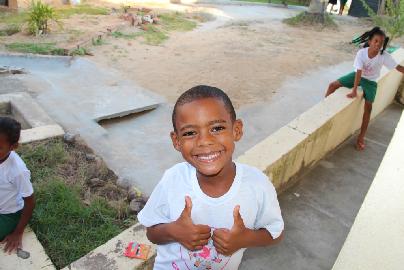|
Help Religious Sisters in Brazil Project Code: 212-05-39 Brazil is one of the top ten economic powers in the world. Yet despite
this, for many Brazilians, life is characterized by the unequal distribution of
social wealth, growing poverty, increasing unemployment and general lack of
opportunities for the future. The northeast of the country is particularly hard
hit by poverty, including the city of Salvador da Bahia, with 2.2 million
inhabitants. One third of its population are descendants of enslaved Africans
who were transported here at the The pastoral and social challenges facing the Church in the archdiocese, which includes the city of São Salvador and several smaller towns in the surrounding area, are immense. Its head, Archbishop Murilo Sebastião Ramos Krieger, is grateful for the assistance of the 50 different communities of religious Sisters who are supporting him in his work. In order to coordinate their activities and combine their formation, these communities have organized themselves as a group – the Grupo das Irmas Inseridas no Meio Popular (GRIMPO). In all kinds of ways they support the work of the Church by caring for the sick and elderly, ministering to those in prison, and above all working in the family apostolate and in the education of children and young people. Take for example the Franciscan Missionary Sisters of Mary. Four of them live in Salinas da Margarida, a small town of 15,600 people in which 90% of the men live by fishing and the women by collecting shellfish. This work means that the women have to be away from home for hours on end, inevitably neglecting the home and the care of their children. The Sisters are supporting these women by helping them to work in a more organized and professional manner and also by helping to care for their children. They have set up a nursery for children aged six and under (which currently has 1,040 small children), as well as a school for 7 – 14-year-olds (with 830 children) and vocational training courses for a further 200 young people. There are sewing and typing courses, a joinery workshop and a brick-making works. In this way they are preparing the young people for a better future, since in most cases the alternative would have been the streets. They are helped in their work by some 150 volunteer helpers whom the Sisters themselves have previously trained. In Sussuarana there are four Sisters of Divine Providence, who have been working there since 1994. Sussuarana is a typical favela, situated on the outskirts of São Salvador. Thousands of desperate people have settled here, on unused land, putting up their tin roofed shacks and hoping to glean a living from the cast-offs of the city. Infrastructure like roads, sewage and electricity is completely nonexistent. When it rains, the favela becomes a treacherous sea of mud. Life expectancy in these favelas is only 46 years vs the Brazilian average of 64. There are no schools here for the children so the Sisters themselves have set up a primary school (for the first four years) which currently has 237 children, aged between seven and fourteen years. Similar work is being done by the four Comboni Sisters in Coqueirinho, who are running a kindergarten with 65 children. Most of the children who come to them are suffering from malnutrition. Their parents are happy to know that their little ones are safe with the Sisters, where they will not only be getting the rudiments of an education but also a solid meal – and not least some basic instruction in their faith. In addition, there are 35 young people and young adults who come to the Sisters for the opportunity to gain some kind of vocational training. In the evenings the classrooms are used for computer courses. All these different communities of religious Sisters within the archdiocese are living on the barest minimum. Since many of them are home-grown Brazilian foundations, and since even the international congregations cannot always count on help from their European mother houses, all these Sisters are desperately dependent on our help. ACN is hoping to be able to contribute $8,100. Will you give to help support the richly blessed work of these 153 Sisters in their 50 different religious communities in Brazil? We are sure they will remember you in their grateful prayers.
Aid to the Church in Need commits to invest your funds where they will have the greatest impact for the Church that we serve. Funds donated to Aid to the Church in Need’s projects will be used towards the greatest need in our programs to help keep the Faith alive.
|
|
|

 height of the colonial era to work on the
tobacco and sugar cane plantations, make up one-third of the population. This
city, the capital of the state of Bahia, has also witnessed a massive influx of
population from the extremely impoverished hinterland. A large proportion of
these newcomers end up stranded in direst poverty in the ever-growing slum
settlements, or favelas, on the
fringes of the city.
height of the colonial era to work on the
tobacco and sugar cane plantations, make up one-third of the population. This
city, the capital of the state of Bahia, has also witnessed a massive influx of
population from the extremely impoverished hinterland. A large proportion of
these newcomers end up stranded in direst poverty in the ever-growing slum
settlements, or favelas, on the
fringes of the city. 